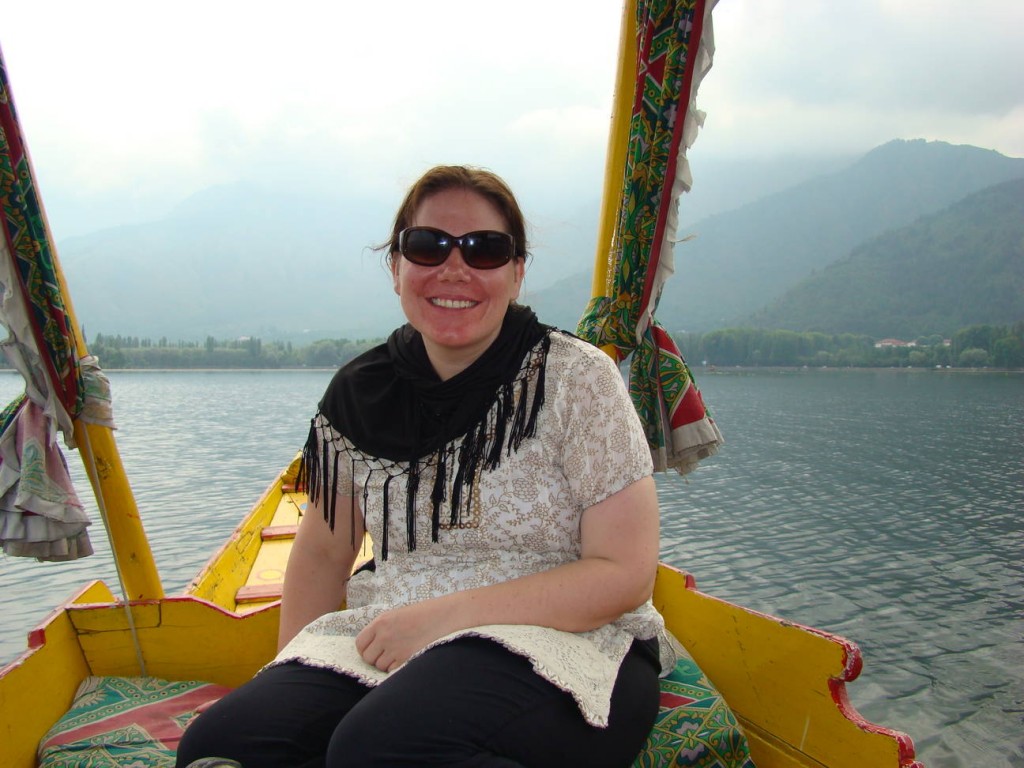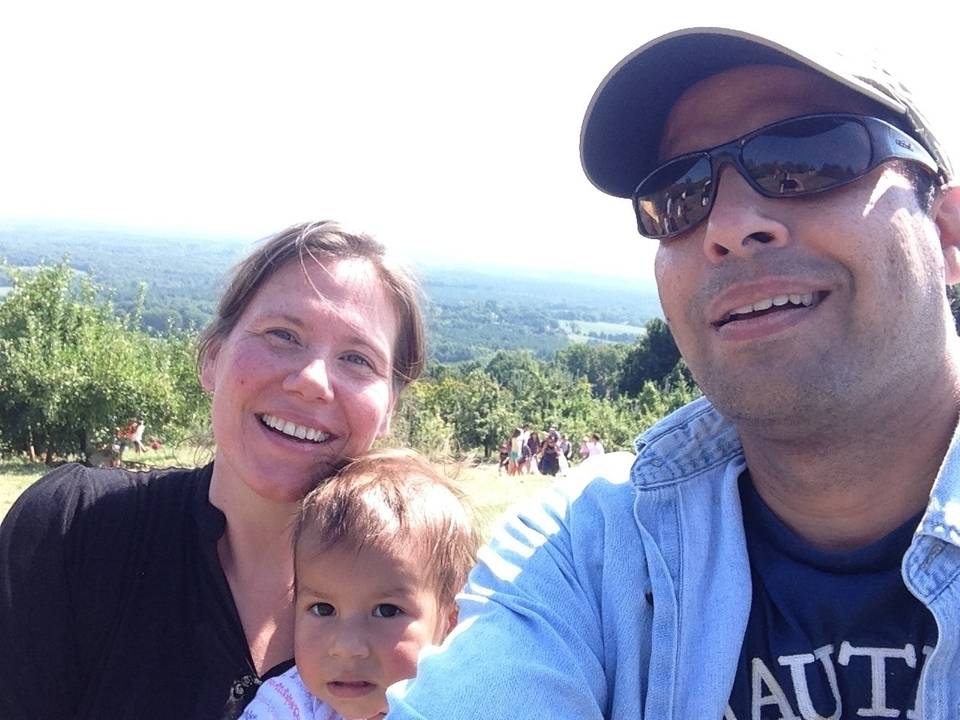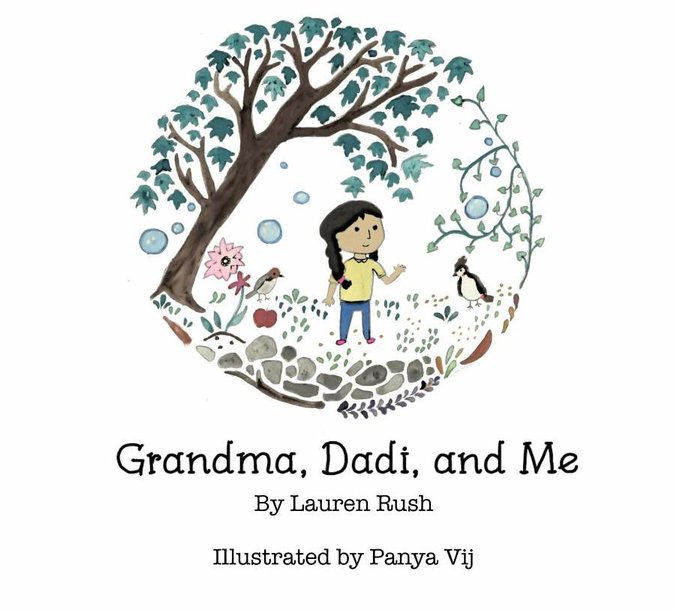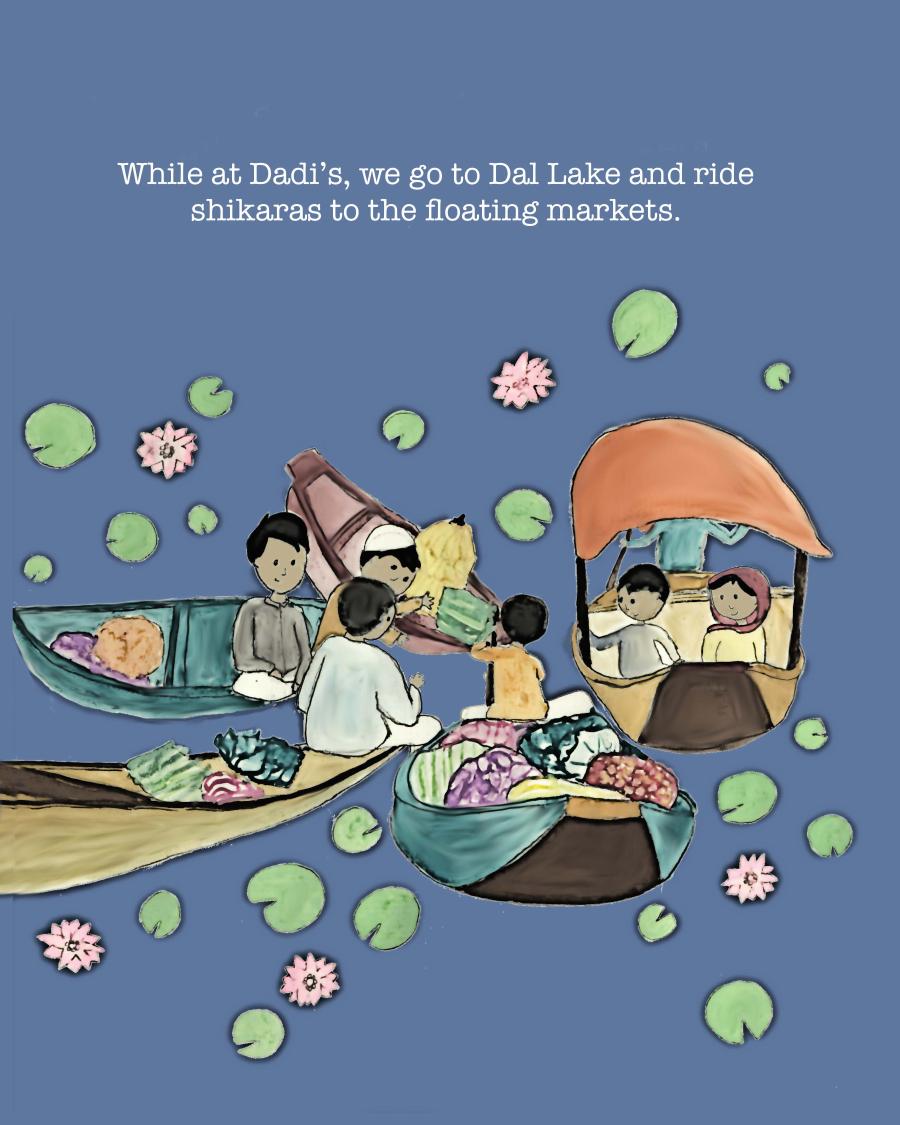Blog, External Affairs
Meet Lauren Rush: Author of Picture Book on American-Kashmiri Children
Tell us about yourself
My name is Lauren Rush and I live in Virginia with my husband Khalid and our three year old daughter. Khalid is from Srinagar, Kashmir. We are lucky to have my parents a few hours away in a small town on Virginia’s Eastern Shore. My in-laws are in Srinagar. My daughter has three cousins all in close age to her in Srinagar – one is quite new and we haven’t met him yet but we all visited and played with her other two cousins in 2014. My mother-in-law has visited here which we all loved.
My formal education is in Food Science (manufacturing and chemistry). However, I am and have been an avid reader since childhood – writing became a great past time over the years. Prior to my daughter’s birth, I worked in the food industry (flavors and fragrances as well as meat processing).
I met my husband in Delhi in 2008.
Tell us about your book Grandma, Dadi, and Me
Grandma, Dadi, and Me is a picture book targeted toward 3-7 year olds. Seema, a five year girl living in the US, has two grandmothers. Her maternal grandmother (Grandma) lives in the US and can be visited by car. Her paternal grandmother (Dadi) lives in Srinagar and can be visited by plane. The book illustrates differences and similarities in visiting both grandmothers.
The books purpose is to show a child in a similar situation (mixed culture and/or a grandparent who lives at quite a distance) that a grandmother’s love is amazing. Even if the food is different. Even if the location is different. An example from the book, Grandma takes Seema to see the ferry at the dock and watch the crabs scuttle in the water. Dadi takes Seema to the floating market on Dal Lake in a shikara. Very different things that end up being similar. Enjoyable times spent with each grandmother near the water.
What was the inspiration behind this book
I’d been scouring Amazon and any other source I can find online to find something that would help my daughter see “herself”. But defining “herself” is hard – a mixed, American – Kashmiri – Muslim dad – Christian mom – growing up in the South (I see many differences from my New Jersey upbringing). I said to myself “Fine! I’ll just write one myself.” And, there ya go. Inspiration. I wanted this book to create a concrete connection to my daughter’s Kashmiri family – to remember visits she’s had and to remind of how things are there when she can’t just hop a plane to visit.
Tell us about the process of making this book
I knew that writing about her grandmothers would be the theme of this book. She loves her GramGram (my mother) and she loves her Dadi – she talks about both all the time. With Skype, she’s able to see both online frequently though she does see her GramGram much more frequently than her Dadi. Plus, I figured this is a great way of helping her see the two different sides of her family – she would be reminded of things she’s seen in Srinagar and also see that some of the everyday things with GramGram are almost identical to her time with Dadi.
Once I had the wording outlined, I placed a local ad for an illustrator. We live in a town with a large university so I thought maybe I could find an art student who’d be interested. And, I did! Panya, the illustrator, is a local student who has travelled all over India visiting family. She was able to easily capture the feel and color palette I was interested in. Also, she was more than willing to help with smoothing out some of flow of the book. We didn’t want it too long, given the age we’re targeting. Panya worked with the guidelines to create artwork, I wordsmithed the final wording. This process took about four-five months. When we were happy with the results, we loaded the book as detailed by Amazon. It is self-published with a print on demand feature so as the book is ordered, Amazon prints copies. We are still fine tuning the Kindle file – that is actually a different format than a print copy.
How is it like raising a child with Kashmiri father and American mother? What are the challenges?
I think raising any child can be challenging! All I can really do is compare my experience with my sister’s experience. My sister married someone of the same faith, same education, and same race here in the US. You’d think that there would be so much common ground that raising their three kids would be smooth sailing. Except – nope. Different kids with different personalities. But, my sister and brother in law have enough common ground that if they go to a store and see an older game in the toy section they can both remember playing with it. Be it Connect 4 (a favorite of mine as a kid) or Clue. Now, as a comparison, my husband played Carrom. I had NO idea what it was. Or, how to play. Or, why you would need borax powder to make the disks go faster.
Another area where a little background education on my part was desperately needed. Hot and cold foods. Again, not even knowing that foods are classified led to some interesting conversations and misunderstanding. Think of this from the Kashmiri perspective – I gave our daughter some cucumber slices at lunch while she had a head cold. My husband was mortified as his life experience says cucumbers will make a cold worse. My experience says feed an unwell kid what they are able and happy to eat.
These are the little everyday things that can make things challenging.
On the larger scale, trying to balance the two cultures, two faiths, and two languages can be daunting at times. I know that my daughter is getting lots of exposure to American living as this is our home. She sees the culture, the media, the sports, etc etc. We actively try to expose her to music and movies that are at least Desi if not Kashmiri. YouTube is a lifeline for these things. Her father also is slowly teaching her Kashmiri (though that is difficult because there really aren’t many resources available). For the most part, my daughter is being exposed to Islam through her dad. She is loving Ramadan this year and can’t wait for Iftar to have her date and a sip of Rooh Afza with her dad. She’s excited for Eid but also knows about and is excited for other holidays like Christmas. So, again, it’s a balance.
Did you travel to Kashmir, how was the experience?
Yes! I’ve been to Kashmir many times. Each trip has been great. The first few trips my in-laws made sure I got to Gulmarg and Pahalgam. We’ve gone to Lal Chowk and the lake. The gardens – just about all the tourist spots. I really enjoy my time there. Kashmiri people have a warmth about them that can’t be beat. Also, the food is amazing. Not just the stalls and whatnot that you see out and about. In my family there, just about every women makes amazing foods. They always make sure there is something to tempt me. Plus, my brothers-inlaw always make sure I have some stand-by American style food for when I’m overwhelmed with meat and rice. (Just a quick side story – last trip was my younger brother’s-in-law wedding. His elder brother made sure there was a loaf of sandwich bread and a jar of peanut butter in our room just in case the days of rich food got to me and I just wanted a break with something I’m familiar with). I’m very lucky to have such amazing brothers-in-law.
What do you think of Kashmiri culture?
Kashmiri culture is really amazing. I love the close knit families and the warm, welcoming strangers. The food is amazing. Seriously, wazwan is something any non-veg person should try at least once. My favorite is Rista and Gustaba from wazwan. Also, since I’m talking about food – morning bread I dream about. Seriously. Some of my fondest memories of trips is hearing the gate open in the morning knowing someone was just at the corner bakery.
I was astounded by the architecture and history of the area too. Something I wasn’t familiar with prior to meeting my husband. I love the homes I’ve been in. They are so much more solidly built than here.
I remember feeling like I found my home away from home seeing a pehin for the first time. I had spent my youth stretching out every sweater or sweatshirt I had with my knees. I just wanted to sit with a nice tent of warmth from the clothes. Then, my family showed me a pehrin and kangri. That was EXACTLY what I wanted my clothes to do with the bonus of a built in heater!
All of that said – not everything is a favorite. I know it’s important culturally and well loved but I just can’t finish a cup of nun chai.
What tips can you give to parents who are from different cultures on raising a kid?
Respect is the number one thing you can give to the variety of cultures in your family. Regardless of what the mix is – be it geographical, religious, race, etc. You need to have respect for your partner’s culture. Your partner need to have respect for your culture. That doesn’t mean you love every little nuance and difference. It means you respect that they are their nuances.
Secondly, you need to reel in expectations. Not everything will be your way even if every fiber of your being says your way is the “correct” way. And, here’s the funny bit, it may not be your partner’s way either because you have this little independent being who may blaze their own way. Thought she was going to love art class? WRONG – she wants to take music class instead.
Finally, you need a sense of humor. I don’t give my daughter cucumbers when she’s ill anymore because of the aforementioned cucumber debate. I could stew about it and how I don’t think it’s scientific to classify foods as hot and cold. But I choose to see it for what it is – a funny quirk of being in a marriage and having a family with someone I love who happens to believe that cucumbers are a cold food and feeding them to our daughter during a cold could lead to pneumonia and a life time of hearing “Lauren, remember that time you fed cucumbers to her and she got pneumonia!!!”. It’s just too small a thing to get bothered about.
How is it like marrying a Kashmiri guy?
This is a tough one since I like to think I’m married to a guy that happens to be Kashmiri. I know it is a part of his identity – but to me, he’s my husband, the guy I love. That being said, I think there are some Kashmiri traits that he posses that can be classified as positives and negatives. On the positives front – very family oriented. He loves to please people be it by offering a cup a tea or spending time in finding the perfect gift. He genuinely wants to have discussions about things, not just time waste by shooting the breeze. He has a great appreciation for nature and would hike every trail he could find if he didn’t have such a heavy work schedule. Cricket, though not easily viewed here, will be on his screen if just the play-by-play during India-Pakistan matches. He firmly believes his mother is a saint and the best cook in the world. Negatives – We’ve broken out of this habit – but – so much rice (keep in mind this is from my point of view – I’m sure there are tons of people who LOVE rice). At the base of it all, Kashmiri men are men and all the regular difference you see between the sexes can come up with them too. They are not immune.
If someone wants to get your book where can they get it from?
Currently, the book is available on amazon.com and createspace.com. It will be released to Kindle soon







